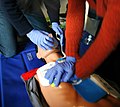Agonal respiration
| Agonal respiration | |
|---|---|

| |
| Synonyms | N/A |
| Pronounce | N/A |
| Specialty | N/A |
| Symptoms | Gasping, labored breathing |
| Complications | Cardiac arrest, hypoxia |
| Onset | Sudden |
| Duration | Short |
| Types | N/A |
| Causes | Cardiac arrest, cerebral ischemia |
| Risks | Sudden cardiac arrest, brain damage |
| Diagnosis | Clinical observation |
| Differential diagnosis | Normal breathing, Cheyne-Stokes respiration |
| Prevention | N/A |
| Treatment | Cardiopulmonary resuscitation (CPR), Advanced cardiac life support (ACLS) |
| Medication | N/A |
| Prognosis | Poor without immediate intervention |
| Frequency | Common in cardiac arrest |
| Deaths | N/A |
Abnormal pattern of breathing characterized by gasping, labored breaths
Agonal respiration is an abnormal pattern of breathing characterized by gasping, labored breaths. It is often associated with severe medical conditions such as cardiac arrest or cerebral ischemia. Agonal respiration is considered a medical emergency and typically requires immediate intervention.
Characteristics[edit]
Agonal respiration is marked by irregular, gasping breaths that are often accompanied by strange vocalizations or moaning. These breaths are usually shallow and may occur at a slow rate. The pattern is often described as "gasping" because it resembles the reflexive gasps for air that occur when the body is deprived of oxygen.
Causes[edit]
Agonal respiration is most commonly associated with:
During these conditions, the brainstem, which controls basic life functions, may continue to send signals to the respiratory muscles, resulting in the characteristic gasping breaths.
Clinical Significance[edit]
Agonal respiration is a sign of severe distress and indicates that the body is not receiving adequate oxygen. It is often one of the last respiratory patterns observed before respiratory arrest.
Emergency Response[edit]
When agonal respiration is observed, it is crucial to initiate emergency medical services and begin cardiopulmonary resuscitation (CPR) immediately. Agonal breaths are not effective in sustaining life, and CPR can help maintain circulation and oxygenation until advanced medical care is available.

Pathophysiology[edit]
The pathophysiology of agonal respiration involves the brainstem's response to severe hypoxia or ischemia. The medulla oblongata, part of the brainstem, plays a critical role in controlling involuntary breathing. When the brain is deprived of oxygen, the medulla may still attempt to initiate breathing, resulting in the gasping pattern seen in agonal respiration.

Differential Diagnosis[edit]
Agonal respiration should be distinguished from other types of abnormal breathing patterns, such as:
Each of these patterns has distinct characteristics and underlying causes.
Related pages[edit]
Gallery[edit]
-
CPR being performed in Afghanistan.
-
Diagram of various breathing abnormalities.
Agonal_respiration[edit]
-
CPR training session
-
Animation of the medulla oblongata
-
Cardiopulmonary resuscitation in Afghanistan
-
Diagram of breathing abnormalities
Ad. Transform your life with W8MD's Budget GLP-1 injections from $75


W8MD offers a medical weight loss program to lose weight in Philadelphia. Our physician-supervised medical weight loss provides:
- Weight loss injections in NYC (generic and brand names):
- Zepbound / Mounjaro, Wegovy / Ozempic, Saxenda
- Most insurances accepted or discounted self-pay rates. We will obtain insurance prior authorizations if needed.
- Generic GLP1 weight loss injections from $75 for the starting dose.
- Also offer prescription weight loss medications including Phentermine, Qsymia, Diethylpropion, Contrave etc.
NYC weight loss doctor appointmentsNYC weight loss doctor appointments
Start your NYC weight loss journey today at our NYC medical weight loss and Philadelphia medical weight loss clinics.
- Call 718-946-5500 to lose weight in NYC or for medical weight loss in Philadelphia 215-676-2334.
- Tags:NYC medical weight loss, Philadelphia lose weight Zepbound NYC, Budget GLP1 weight loss injections, Wegovy Philadelphia, Wegovy NYC, Philadelphia medical weight loss, Brookly weight loss and Wegovy NYC
|
WikiMD's Wellness Encyclopedia |
| Let Food Be Thy Medicine Medicine Thy Food - Hippocrates |
Medical Disclaimer: WikiMD is not a substitute for professional medical advice. The information on WikiMD is provided as an information resource only, may be incorrect, outdated or misleading, and is not to be used or relied on for any diagnostic or treatment purposes. Please consult your health care provider before making any healthcare decisions or for guidance about a specific medical condition. WikiMD expressly disclaims responsibility, and shall have no liability, for any damages, loss, injury, or liability whatsoever suffered as a result of your reliance on the information contained in this site. By visiting this site you agree to the foregoing terms and conditions, which may from time to time be changed or supplemented by WikiMD. If you do not agree to the foregoing terms and conditions, you should not enter or use this site. See full disclaimer.
Credits:Most images are courtesy of Wikimedia commons, and templates, categories Wikipedia, licensed under CC BY SA or similar.
Translate this page: - East Asian
中文,
日本,
한국어,
South Asian
हिन्दी,
தமிழ்,
తెలుగు,
Urdu,
ಕನ್ನಡ,
Southeast Asian
Indonesian,
Vietnamese,
Thai,
မြန်မာဘာသာ,
বাংলা
European
español,
Deutsch,
français,
Greek,
português do Brasil,
polski,
română,
русский,
Nederlands,
norsk,
svenska,
suomi,
Italian
Middle Eastern & African
عربى,
Turkish,
Persian,
Hebrew,
Afrikaans,
isiZulu,
Kiswahili,
Other
Bulgarian,
Hungarian,
Czech,
Swedish,
മലയാളം,
मराठी,
ਪੰਜਾਬੀ,
ગુજરાતી,
Portuguese,
Ukrainian



